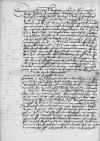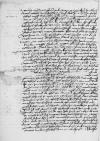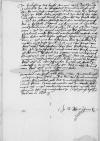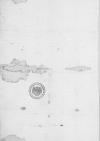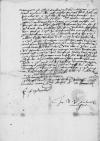Ich hab gesternn Ewer Furstlicher Irbarkeit ⌊⌋ / mit sundremm wolgefallenn entphangen, / daraus ich Ewer Irbarkeit maynung / und freuntlichenn willen gen mir gernn vornomenn, / und bedanck mich hochlichen der mhue und freuntlicher sorgfeldigheit, die Ewer Irbarkeit mir zum bestenn bey sich tregt. / Wor ich ouch das selbtige werde ummer wissen und vormugenn treulich und fleissig zu beschulden und vordynenn, / sol mich Ewer Irbarkeit nicht nochlessig findenn. /
Was belangt denn hern ⌊doctorr Reynek⌋, / wil ich Ewer Irbarkeit wie meymm vil liebennn hernn und hochem freunde vortrauter weis nicht bergen, / das mein erste kuntschafft mit im ist vor III joren zu ⌊Augspurg⌋ uffmm ⌊reichstage⌋ gewest. / Wart zu mir an mein tisch von hern ⌊Cornelio Sceppero⌋, / der iczunder nicht lengst vorgangen vonn ⌊kayserlicher maiestet⌋ aus ⌊Hungernn⌋ zum ⌊Turkenn⌋ genn ⌊Constatinopel⌋ geschickt ist wordenn, / mit gebrocht / und mit mir bekant gemacht / wie einer, der neulich aus ⌊Engelland⌋ w[er] komenn unnd ...ller hendel heimlich... ⌊Francreich⌋, / Engellandt / un..., welche er ⌊romischer koniglicher maiestet⌋ / durch underredung mit hern ⌊Wilhelm vonn Rogendorff⌋ / erböttig war zu entdeckenn, / vorhoffend villeicht ein nuczliche stelle amm hove / oder was anders zuerlangen etc. Nicht lengst dar noch wolt er hundert ducaten von mir leyenn, eh... dan ich wust wer / oder vonn wan / er werr. Darnoch sach ich in ein gutte weil lang nicht, / biss das wir mit ⌊kayserlicher maiestet⌋ etlich vil monat im ⌊Niderland⌋ zu ⌊Brussel⌋ worenn gewest. / Do kuam er widerummb an meynenn tisch / und wold abermol[s] gelt von mir leyenn. / Zu leczst, / do sein ding am hove nicht fortging, / bat er von mir ann Ewer Irbarkeit einn vorschrifft, / anczeigende, / er wolt erst ann ⌊konigliche wird⌋, / in Got negst vorstorben, / in ⌊Dennemarken⌋ sich begebenn. / Derhalben, was ich gedochter ⌊koniglichern wird⌋ dass mol zum bestenn wust, / teilt ich im mit / und gab im nicht sunder ursach an Ewer Irbarkeit mein vorschrifft, / als eynemm, der gelert und geschickt genug, / ouch mit hern / und etwen geswyndenn hendlennn wol weis umbczughenn / und das in Ewer Irbarkeit im Reich heth mocht brauchen. / So ist er mit meynemm brive an Ewer Irbarkeit genn ⌊Danczk⌋ komenn, / noch meyner freuntschaft gefrogt / und sich zu der eingelossenn, / kein schrifft oder befhel habende von mir, / allein den briff an Ewer Irbarkeit geczegt und so mein freuntschafft mein hant erkannt. / Habenn im von meynenn wegen ehre und guts bewysenn, / wor inne er nicht gesetiget. / So vil gesagt, / wie er so wol mit mir darann wer / und so, / ich weis nicht wie, / an mein willenn und wissenn und meyner ⌊bruder⌋, / nichts habende, / meyne ⌊svester⌋ in die ehe uberredt, / das dan in warheit mir und dennn meynen nicht hot mocht sein unbesverlich. / Idoch, / do ich ins ⌊land⌋ gekomenn, / hab ich die meynenn und mich in gedult gestelt / und do mit / etlicher moss / solche sver muttigheit gestilt / und solche geswyndigheit uberwonnenn. / Hab ⌊in⌋ und ⌊sie⌋ bey mir ein gutte zceit lang enthalden, / biss das sie williglich von sich selbst von hynnenn sein geczogenn etc. und do mit, das ich nicht vor ...ff ein historienn schreibe, ... ...ssend / ...nczk bey mir ... alles noch seinemm hochtragenden houpte habenn. / Do das nicht mocht geschenn, / enthild ⌊er⌋ sich etlich zceit von mir / unnd do es im widerummb wol gefyl, / macht er sich wider zu mir. Ich hab ⌊im⌋ nye kein böss wort geben, / alles mit im ubersehenn, / an meymm tisch gelossenn / und gesegend, do ich von dannenn mich begab. / Dornoch schreib ⌊er⌋ mir ein spiczigenn briff, / das ich meynn zunegung zu im heth abgelossenn / und wer mit unmessiger vorleczung meins gemuets / hesslich oder neydisch, / wie er schreibt, / odiosius, / wider in enczundt, / und so ich seiner nicht bedarff, / und das ander nicht gancz vorgessenn ist, / do von die leut vil redenn, / do mit er mich und die meynenn vorseret, / heth er solch stolcz schreibenn, / und nemlich am endt, / er must sein alte hern, / do mit er nicht vorgessenn, / besuchennn etc. wol mocht noch lossenn. / Dis ist alles, / freuntlicher, lieber herr, das zcwischenn uns ist, / und wirt sich etwas anders habenn, dan ⌊er⌋ anczeigt, / nichts wynigers, / so ich so cristlich und freuntlich von Ewer Irbarkeit werd ermant, / der ich nichts vorsagenn kann, / stelle ich dis alles in Ewer Irbarkeit hende, / und was die wil / bin ich anzunhemenn willig. / Ich hab im lengst vorgebenn / und vorgib im. / Wan ein sache geschen ist, / kompt der rodt zu speth etc. Bitt, / wie im dan sey, / Ewer Irbarkeit wolt sein gnediger herr sein / und dis meynn schreiben, / das so, / Ewer Irbarkeit zu erinnernn, / die not erfurdert, / gunstlich von mir an nhemenn / und so bey Ewer Irbarkeit allein lossenn bleibenn / und mich do vor halten, / der Ewer Irbarkeit noch al meyner muglicheit gernn treulich und fruntlich dynenn wil. / Sol ouch nicht anders vonn mir werdenn befundenn. / Wie aber Ewer Irbarkeit im endt Irs schreibens mich an nympt vor iren beichtvatter, / wil ich mich in demm ampt so halten, / das sich Ewer Irbarkeit mit sverer buss von mir nicht sol beladenn fyndenn. / Got der almechtig gebe uns sein gnad / und enthalde Ewer Irbarkeit mit al den irenn in langweriger gesuntheit und glukseligen zu nhemenn / uff das aller lengste etc. Hiemit thu ich mich in Ewer Irbarkeit gunst [un]d fruntschafft uffs fleissigste bef... ...rer vormanu... nicht vorgessenn, / do mit vil ... selbtigenn endung / noch blibe etc.
In beslissung dis briffs sein mir worden / die spruche ⌊Salomonis⌋, / die der hochgelert ⌊Ioannes Campensis⌋ hie bey mir dissen vorgangenn winter aus dem hebreisschen in klar latin geseczt / und im druk hot lossenn aus ghen, / mich durch sein schreiben vonn ⌊Krako⌋ bittend, / Ewer Irbarkeit die selbigen spruche / und sein auslegung uff die II episteln sancti Pauli ad Romanos et Galatas / mitzuteilen und zu sendenn. / Und so ich dan weis, das Ewer Irbarkeit in seiner auslegung des psalters unnd psalmenn / nicht kleinenn wolgefallenn gehabt, / ouch gern beten und lesen pflegt, / hab wir disse buchlein Ewer Irbarkeit mit den ersten wollen zustellenn, / do neben ouch disse zceitung, / so mir von ⌊Prage⌋ von ⌊kayserlicher maiestet⌋ botschaffternn, demm hern electen von Lunden, sein zugeschribenn, / ouch was vonn ⌊Krako⌋ an mich ist komenn, / bittend die copeyen mir widerzusenden. / Ouch wil ich Ewer Irbarkeit nicht bergenn, / das ich negst vonn meynemm vortrautenn freunde, hern ⌊Cornelio Sceppero⌋, ⌊kayserlicher maiestet⌋ orator, aber ⌊⌋ entfangen habe, / in welchem er mir anczeigt, / das er widerummb von kayserlicher maiestet aus ⌊Hispanien⌋ post... ...pol zum grossen ... wordenn. / Vorhofft vil gut... wa... fried belangt, / auszurichtenn, / vil anders dann von ⌊Krako⌋ mir wirt geschribenn. / Got gebe, das er mit gesuntheit widerumb komme. / Was ich weiter von im werde haben, wil ich Ewer Irbarkeit vortrauter weis gernn mitteilenn. / Hiemit thu ich mich aber in Ewer Irbarkeit gunst befelen. / Datum ut in litteris etc.
⌊
Ioannes⌋, bischoff zu ⌊Culmen⌋ etc. scripsit
